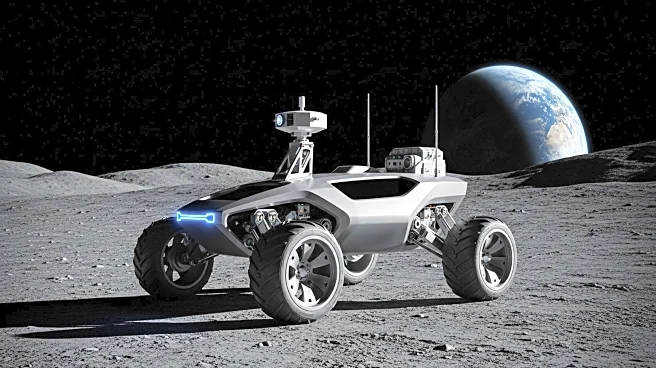What's Happening?
Intuitive Machines, a Houston-based company known for its lunar lander missions, is competing to build NASA's next lunar rover for the Artemis moon missions. The company is part of NASA's Commercial Lunar Payload Services (CLPS) program and has developed the Nova-C lunar lander. Intuitive Machines plans to create a larger Nova-D cargo lander to transport its rover, the Moon Reusable Autonomous Crewed Exploration Rover (RACER), to the lunar surface. The rover race involves three industry teams, including Lunar Outpost and Venturi Astrolab, each vying for NASA's Lunar Terrain Vehicle (LTV) Services contract, valued at up to $4.6 billion through 2039.
Why It's Important?
The competition for NASA's LTV contract is significant as it promises a decade-long deal supplying rovers for Artemis astronauts, with geopolitical and economic implications. Robust lunar mobility is crucial for a sustained human presence on the Moon and could initiate a cislunar economy. Companies are already planning to use these rovers for other missions, marking a new era of moon exploration driven by science and commerce. Winning the contract would not only secure a lucrative long-term deal but also enhance the prestige of building the first crewed lunar rover in over 50 years.
What's Next?
NASA plans to downselect to a single provider for the actual lunar rover mission after the current studies. The agency will request proposals for a demo mission rover to be delivered to the Moon and test-driven before the Artemis V crew arrives. The chosen rover will need to land on the Moon, drive autonomously, and validate all systems in the harsh lunar environment. If successful, NASA intends to have the rover ready for the Artemis V landing, currently targeting 2029, with additional rover orders potentially following for later Artemis missions through the 2030s.
Beyond the Headlines
The lunar rover competition reflects the changing landscape of space exploration, with implications for science, business, and international relations. NASA's outsourcing of the Artemis rover catalyzes a new commercial space sector, potentially accelerating a 21st-century 'Moon rush.' The competition is a case study in public-private partnership, seeding the development of capabilities that companies can turn into businesses. The geopolitical angle is significant, as the success of Artemis and its commercial rovers could influence which vision of lunar development gains momentum.










